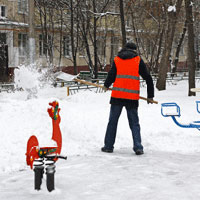Winter Storm Hazards
February 19, 2019 Winter storms pose several hazards to construction workers including cold stress, downed power lines, snow-logged rooftops, and icy roads. To ensure that they are prepared for the winter season and the aftermath of winter storms, the Occupational Safety and Health Administration (OSHA) recommends that employers and workers take several precautions, including:
Winter storms pose several hazards to construction workers including cold stress, downed power lines, snow-logged rooftops, and icy roads. To ensure that they are prepared for the winter season and the aftermath of winter storms, the Occupational Safety and Health Administration (OSHA) recommends that employers and workers take several precautions, including:
- Wear appropriate footwear – Slip and fall accidents are common during winter storms because there is snow and ice on the ground. People coming in from outside may also track water in, making walking surfaces slippery. Workers should wear insulated, water-resistant boots with rubber treads to improve traction and employers should place signage in front of slip hazards to warn employees.
- Drive safely – Employers should train workers on how to drive during winter storms when roads are covered with snow or ice as well as how to check vehicle systems including the brakes, cooling system, electrical system, engine, exhaust system, tires, oil, lights, windshield wipers, and defrosters. Regular maintenance on vehicles and mechanized equipment is also necessary.
- Exercise caution when working on or around damaged power lines – Workers who repair or replace damaged power lines must follow OSHA standards and safe work practices to avoid electrocution and other electrical injuries such as burns from electrical fires or “struck by” injuries from falling objects. Electrical linemen must ensure that they have the appropriate gear such as insulated gloves, tools, and boots.
- Evaluate snow removal tasks – Employers should make plans for workers to remove snow safely. Working at heights on rooftops is already a dangerous task; according to OSHA, falls remains one of the “fatal four” causes of construction worker deaths. Winter weather poses additional hazards due to the slippery ice and snow which may be covering skylights and other weak surfaces that workers may fall through.
- Make sure powered equipment is grounded – Snow blowers can cause serious injury if they are improperly handled or inadequately maintained. It is important to make sure all equipment is grounded properly to prevent electric shock or electrocution during operation. Powered equipment must also be guarded and disconnected during maintenance in accordance with lockout/tagout best practices. Workers should avoid clearing any jams or reaching in with their hands while the equipment is still on.
- Set up work zones properly – Construction workers who work on the roads are at increased risk of being struck by vehicles during winter storms due to icy road conditions. Drivers may hydroplane or lose control of their vehicles, causing them to strike workers in the vicinity. Work zones should therefore be properly set up with signs and barriers to protect workers.
- Guard against the cold – Extreme temperatures can cause workers to suffer injuries such as exhaustion, dehydration, and frostbite. Workers who shovel snow should wear the appropriate insulated, water-resistant clothes and footwear, warm up beforehand, and take frequent breaks. They should also be trained on proper lifting technique to avoid back and other strain injuries.
Philadelphia Construction Accident Lawyers at Galfand Berger LLP Help Workers Injured in Winter Storms
If you were injured at work during a winter storm, contact a Philadelphia construction accident lawyer at Galfand Berger LLP. Our experienced attorneys represent clients in Philadelphia, Reading, Bethlehem, Allentown, and Harrisburg, Pennsylvania, and throughout New Jersey. To schedule a free consultation, please complete our online contact form or call us at 800-222-USWA (8792).
 Google Screened
Google Screened
